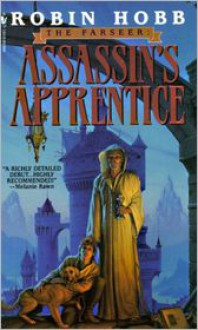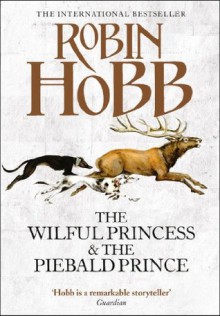
by Robin Hobb
Having read Assassin's Apprentice and enjoyed what I've read of the Farseer series, I could not resist when I saw that reviews were wanted for Fool's Assassin, the first book of a related trilogy with Fitz as an adult, now called FitzChivalry Farseer. There are plenty of references to people and events from the first book of the first series to make a connection and to explain significant elements to readers new to the series.
The story begins with a letter written by Queen Desire, second queen to King Shrewd and enemy to Fitz, or anyone else she may perceive as standing between her son and the throne. Fitz thinks the queen was behind his father's murder, though much time has passed and he is now in middle age and has a grown daughter.
There are several new characters to add to the familiar ones and the sense of intrigue begins pretty much immediately with the arrival of a group of suspicious minstrels with no instruments to a mid-winter celebration, as well as a strange messenger who Fitz doesn't go to see right away because he is needed as host to his party.
Hobb's naming conventions are consistent in that characters are given obvious names according to their positions in the court. The story does a good job of explaining salient points from the previous series well so that new readers will be able to follow what's going on and references to things like the Forged, even if they have not read all of the books. I became aware that I have missed much about the Foil and a pet wolf in the intervening books, but the references brought me up to speed.
The book also clearly explains the difference between the Wit, which is a psychic connection on an animal level, and the Skill, which is human to human mind communication. These abilities play a significant role in both series.
One thing that bothered me about this one is that Fitz, who was trained to be an assassin at a young age, is not paranoid enough when the dodgy entertainers are observed. For someone with his history, he doesn't seem to have much of a sense of preservation.
When blood is spilled during his holiday celebration, he realizes that he enjoys the hunt on an animal level because of an affinity he had formed with his wolf in an earlier story. The Skill is convenient for communication with family from different parts of the manor as he seeks for clues and his animal senses from the Wit show their true value when a crisis requires getting past a lock against the Skill to save the life of an important character. It becomes apparent that writing his chronicles has played an important role in the earlier books and that a legendary entity known as the White prophet plays a key role in this story.
The story is well told, yet I found it rather depressing. Middle age, failing health of his wife and painful memories of much of his past life conspire to make the story all too reminiscent, though there is action if you can get past the first few chapters. The story is left with an obvious intent towards continuation, but I felt the series had already reached a point where it feels tired. I'm hoping to see the author move on to something new as she has shown that she can weave a decent fantasy tale and it would be of interest to see how her writing matures.

 Log in with Facebook
Log in with Facebook 









